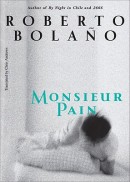A weekly roundup of noteworthy reviews from other sources.
 Will Blythe reviews Roberto Bolaño’s Monsieur Pain, “a surrealist’s attic of unlikely juxtapositions” in which “[t]he expectations of a conventional mystery are thwarted at every turn.” . . . Alan Wolfe is very clear: “Let’s get my judgment of Thomas Sowell’s new book out of the way first. There is not a single interesting idea in its more than three-hundred pages.” But that judgment doesn’t get out of the way so much as it gets repeated in different varieties throughout the review: “The flatness of [Sowell’s] sentences is matched by the flatness of his trajectory. Whatever darkness exists in the world does not reside in his soul. He undertakes no bildung and experiences no crises. He learns nothing that does not confirm what he already knew. If he were a character in a novel, it would end on page one.” . . . I recently mentioned David Peace on the blog. Richard Rayner reviews his latest, based on a real-life 1948 crime in which a Tokyo bank robber poisoned a dozen people. (Rayner: “Expect to be enthralled and maybe amazed, although not cheered up or even necessarily entertained.”) . . . Graeme Wood says that the stories in Ted Conover’s The Routes of Man, about global roadways (in China, Peru, Israel, etc.), are “compelling,” and that: “The book’s faults mostly follow from its broad theme and structure. Indeed, so loose is the organizing principle that two of the chapters, including the best, have little to do with roads.” . . . The New Republic’s new review site, The Book, joins The Second Pass (and others, of course) in appreciating more obscure titles. This week, acclaimed Dostoevsky biographer Joseph Frank writes about a memoir by someone who grew up in Mussolini’s Italy before moving to Palestine. . . . A review to print out and read over the weekend: William Deresiewicz on the stories Tolstoy wrote in old age, a time in the author’s life “marked by a turn toward ideological radicalism and spiritual extremity.”
Will Blythe reviews Roberto Bolaño’s Monsieur Pain, “a surrealist’s attic of unlikely juxtapositions” in which “[t]he expectations of a conventional mystery are thwarted at every turn.” . . . Alan Wolfe is very clear: “Let’s get my judgment of Thomas Sowell’s new book out of the way first. There is not a single interesting idea in its more than three-hundred pages.” But that judgment doesn’t get out of the way so much as it gets repeated in different varieties throughout the review: “The flatness of [Sowell’s] sentences is matched by the flatness of his trajectory. Whatever darkness exists in the world does not reside in his soul. He undertakes no bildung and experiences no crises. He learns nothing that does not confirm what he already knew. If he were a character in a novel, it would end on page one.” . . . I recently mentioned David Peace on the blog. Richard Rayner reviews his latest, based on a real-life 1948 crime in which a Tokyo bank robber poisoned a dozen people. (Rayner: “Expect to be enthralled and maybe amazed, although not cheered up or even necessarily entertained.”) . . . Graeme Wood says that the stories in Ted Conover’s The Routes of Man, about global roadways (in China, Peru, Israel, etc.), are “compelling,” and that: “The book’s faults mostly follow from its broad theme and structure. Indeed, so loose is the organizing principle that two of the chapters, including the best, have little to do with roads.” . . . The New Republic’s new review site, The Book, joins The Second Pass (and others, of course) in appreciating more obscure titles. This week, acclaimed Dostoevsky biographer Joseph Frank writes about a memoir by someone who grew up in Mussolini’s Italy before moving to Palestine. . . . A review to print out and read over the weekend: William Deresiewicz on the stories Tolstoy wrote in old age, a time in the author’s life “marked by a turn toward ideological radicalism and spiritual extremity.”

